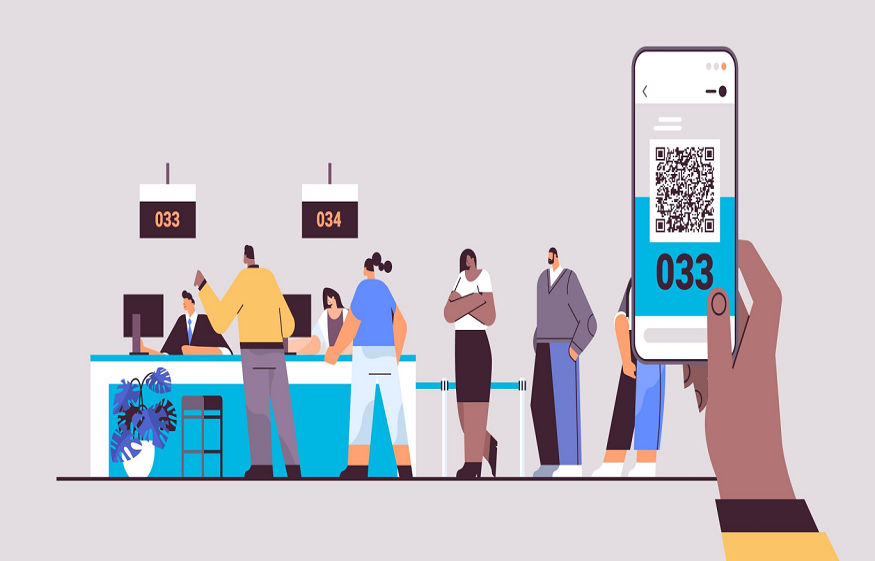
Efficient queue management systems have become paramount for businesses to ensure smooth customer experiences. The traditional method of waiting in long queues can be frustrating and time-consuming, leading to customer dissatisfaction and decreased productivity. However, with the advent of mobile queue systems, businesses can streamline their operations, enhance customer satisfaction, and boost overall efficiency.
This article will explore the benefits of implementing mobile queue systems and how they can revolutionize how businesses manage queues.
Understanding the Queue Management System:
A queue management system, or a queue system, is a digital solution that enables businesses to effectively manage customer flow, eliminate physical queues, and provide a seamless waiting experience. These systems leverage mobile technology and software applications to allow customers to join queues remotely, receive real-time updates, and monitor their position in the queue, all through their smartphones.
Enhancing Efficiency and Customer Experience:
1. Eliminating Physical Queues:
The days of standing in long, cumbersome queues are gone, thanks to mobile queue systems. With these systems in place, customers can simply use their smartphones to secure a spot in the queue from anywhere, whether at home or on the go. This eliminates the need for customers to physically wait in line, allowing them to utilize their time more efficiently.
2. Real-Time Updates:
Mobile queue systems provide customers with real-time updates on their queue status, estimated wait times, and any changes in their position in the queue. This transparency keeps customers informed and reduces their anxiety and uncertainty about when their turn will come. By leveraging push notifications and SMS alerts, businesses can keep customers engaged and informed, enhancing their overall experience.
Improving Operational Efficiency:
1. Optimizing Staff Allocation:
With mobile queue systems, businesses can better manage their staff resources by analyzing queue data and allocating staff members accordingly. By accurately predicting customer flow patterns, businesses can ensure that the right number of employees is present to handle the anticipated workload. This prevents overstaffing or understaffing scenarios, leading to optimized resource allocation and improved operational efficiency.
2. Streamlining Service Delivery:
Mobile queue systems allow businesses to optimize service delivery by reducing wait times and increasing customer throughput. By efficiently managing the queue and eliminating bottlenecks, businesses can serve more customers in less time, improving customer satisfaction and increasing revenue.
Increasing Productivity and Profitability:
1. Self-Service Options:
Mobile queue systems often offer self-service options like virtual check-ins or online appointment scheduling. These features empower customers to take control of their waiting experience and choose a convenient time slot for their visit. By enabling customers to schedule appointments in advance, businesses can reduce walk-in wait times, improve staff productivity, and enhance overall customer satisfaction.
2. Data Analytics and Insights:
Mobile queue systems provide valuable data and analytics that enable businesses to gain insights into customer behavior, peak hours, and service demands. By leveraging this data, businesses can make data-driven decisions to optimize their operations, identify areas for improvement, and enhance the overall customer experience. Tracking and analyzing queue metrics allows businesses to identify trends and implement strategies to drive profitability.
The Role of Mobile Apps:
Mobile queue systems often utilize dedicated mobile applications that customers can download and use to access the queue management system. These apps provide a user-friendly interface, allowing customers to join queues easily, receive notifications, and access relevant information. Businesses can customize these apps to align with their brand identity, enhancing the overall customer experience.
Reducing Physical Contact and Enhancing Safety:
Mobile queue systems have gained even more significance in light of the COVID-19 pandemic and the need for social distancing. By eliminating physical queues and enabling remote queue management, businesses can reduce crowded waiting areas and minimize physical contact between customers and staff. This enhances safety and instills a sense of trust and reassurance among customers, leading to increased customer loyalty.
Integration with Existing Systems:
Mobile queue systems can seamlessly integrate with a business’s existing systems, such as customer relationship management (CRM) or point-of-sale (POS) systems. This integration allows for a smooth flow of information, enabling businesses to provide personalized services, track customer preferences, and streamline operations. Integrating with existing systems ensures a cohesive and efficient workflow across all touchpoints.
Conclusion:
Mobile queue systems have transformed how businesses manage queues and interact with customers. These systems enhance operational efficiency, customer satisfaction, and overall profitability by eliminating physical queues, providing real-time updates, optimizing staff allocation, and offering self-service options. Embracing mobile queue systems improves the efficiency of queue management and demonstrates a commitment to delivering exceptional customer experiences. In today’s digital era, businesses that invest in mobile queue systems position themselves at the forefront of innovation, setting themselves apart from competitors and creating a positive and memorable customer journey.
Don’t let your queues hold you back. Upgrade to NEMO-Q and transform your business today.
